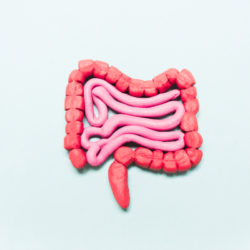A review of the scientific literature published on 15 July in the journal Nature Reviews Microbiology by researchers from the University of Cork in Ireland highlights the impact of food choices on the composition and functioning of the intestinal microbiota. In particular, the study explores how geographical location and eating habits influence intestinal health.
The results highlight the crucial role of the intestinal microbiota in preventing chronic disease and improving psychological well-being. Through a comparative analysis of several diets (Mediterranean, vegetarian, ketogenic and Western), the researchers provide essential insights to guide future nutritional recommendations.
Intestinal microbiota and human health
The links between microbiota and human health have been confirmed over the last 15 years thanks to high-throughput sequencing and analysis of human microbiota. However, these relationships are still at the study stage, with the aim of understanding the regulation of numerous metabolic processes and identifying possible therapeutic uses.
The intestinal microbiota refers to all the bacteria, viruses, protozoa and fungi that inhabit our digestive tract. Its diversity and balance play a fundamental role in maintaining overall health. Recent research has shown that the intestinal microbiota influences not only digestion and the metabolism of nutrients, but also the functioning of the immune system and psychological well-being. An imbalance in the microbiota(dysbiosis) can therefore contribute to the development of various pathologies, such as inflammatory bowel disease, type 2 diabetes and depression.
Impact of diet on intestinal microbiota
While previous studies focused mainly on the effects of antibiotics, current research is highlighting the influence of dietary choices on the microbiota. Dietary changes can have immediate effects, but it is the long-term adoption of a balanced diet that promotes a beneficial microbial composition.
Technological advances (metagenomic sequencing and analyses assisted by artificial intelligence) are opening the way to precise mapping of microbial diversity and a better understanding of its interactions with the body. These advances make it possible to imagine personalised nutritional recommendations. These would be based on the individual composition of the microbiota in our intestines.
Individual variations in intestinal microbiota
The composition of the microbiota varies from one individual to another depending on genetic factors, lifestyle and eating habits. But not only that…
Researchers at the University of Cork point out that geographical location influences the microbial composition in the intestine. For example, certain foods that are beneficial for one population may have less favourable, or even harmful, effects for another, due to genetic and cultural differences.
There are also differences in the response of the intestinal microbiota to diets. This individual variability explains why a diet that improves the health of one individual may not produce the same effects in another. These observations underline the importance of a personalised nutritional approach that is also adapted to the specific composition of each person’s intestinal microbiota.
Comparative analysis of the impact of the main diets on the intestinal microbiota
The most common diets have been studied for their impact on the health of the intestinal microbiota. Other dietary characteristics have received little attention. Let’s take a look at the documented diets.
Mediterranean diet
The Mediterranean diet, also known as the Cretan diet or the Mediterranean diet, was invented in the 1960s. It is inspired by the traditional cuisines of southern Spain, Crete and southern Italy.
Composition and characteristics
The Mediterranean diet favours unprocessed foods, mainly of plant origin, such as fruit, vegetables, legumes, wholegrain cereals and nuts. It includes healthy fats from olive oil. Not forgetting moderate amounts of dairy products, seafood and red meat.
Effects on intestinal microbiota and health
This diet encourages the proliferation of beneficial bacteria, such as Faecalibacterium prausnitzii and Roseburia spp. It reduces the presence of potentially harmful bacteria, such as Ruminococcus gnavus, Ruminococcus torques and Collinsella aerofaciens. Its ‘vegetarian-friendly’ variant increases the abundance of Prevotella spp. and reduces that of Bifidobacterium spp. This new balance has a direct impact on weight loss and improved cardiac markers.
Vegetarian diet
Vegetarianism is a dietary practice that excludes the consumption of animal flesh. It is associated with vegetarian cooking.
Anti-inflammatory and anti-pathogenic benefits
Vegetarian diets, based on a high consumption of vegetables, fruit, whole grains and pulses, share many benefits with the Mediterranean diet. Their richness in polyphenols gives them anti-inflammatory and anti-pathogenic properties, which are beneficial for intestinal health.
Impact on microbial composition
A diet rich in fibre encourages the proliferation of Bifidobacterium spp, Firmicutes and Lactobacillus spp , bacteria capable of fermenting complex polysaccharides and producing short-chain fatty acids, which are essential for intestinal health. By reducing the risk of chronic diseases such as type 2 diabetes and certain cancers, this type of diet helps to maintain a balanced intestinal microbiota.
Ketogenic diet
The ketogenic diet was studied and disseminated in the United States from 1921 onwards, when Dr Wilder put forward the hypothesis of a fatty diet linked to ketonemia. Doctors Helmholtz and Keith experimented with it as a treatment for epilepsy. The ketogenic diet is traditional among the Inuit, the Maasai and certain indigenous peoples of North America.
Metabolic mechanisms and impact on the intestinal microbiota
The ketogenic diet is based on a drastic reduction in carbohydrates, a high consumption of fats and a moderate intake of proteins. This type of diet induces a state of ketosis. The body uses ketones as a source of energy, simulating the effects of fasting. This diet is now attracting growing interest for its effects on weight loss and metabolic health.
Potential risks for the immune system
However, its impact on the intestinal microbiota remains controversial. The diet leads to a significant reduction inActinobacteria and Firmicutes populations, which could alter the microbial balance. Some studies have also highlighted a reduction in immune response, underlining the need for further investigations to assess the long-term effects of this diet.
Western diet
The Western-style diet was introduced in part by the Neolithic revolution 10,000 years before our era, and above all by the industrial revolution at the beginning of the 19th century.
Negative consequences for microbial diversity in the intestine
The Western diet, characterised by excessive consumption of ultra-processed foods, refined sugars and saturated fats, has deleterious effects on the intestinal microbiota. It reduces microbial diversity and leads to a proliferation of pathogenic bacteria, thereby upsetting the balance of the intestinal ecosystem.
Links with chronic diseases
This alteration in the intestinal microbiota is associated with an increase in inflammatory markers and a reduction in the immune response. It therefore encourages the development of chronic diseases such as obesity, type 2 diabetes and cardiovascular disease. Because of its harmful effects on health, this diet is unanimously advised against by nutrition experts.
Towards precision nutrition based on the microbiome
Micronutrition and knowledge of the microbiome provide a framework for precision nutrition, capable of improving individual health.
Personalised dietary recommendations
Given the individual variability of the intestinal microbiota, researchers are arguing in favour of a ‘ precision nutrition’ approach , tailored to the specific needs of each individual. By analysing the microbial composition of the intestine, the recommendation of targeted foods would help to restore the balance of the microbiota and thus prevent the development of chronic diseases.
Therapeutic prospects for metabolic diseases
This approach opens up new therapeutic prospects, particularly for the treatment of diabetes, obesity and inflammatory bowel disease. By modifying the composition of the intestinal microbiota through diet, it may be possible to regulate metabolism, boost the immune response and improve general well-being.
Conclusion
Dietary choices have a decisive influence on the composition and functioning of the intestinal microbiota. While the Mediterranean and vegetarian diets have proven beneficial effects, the ketogenic diet requires further study to assess its long-term effects. Conversely, the Western diet, rich in ultra-processed foods, is clearly associated with a deterioration in intestinal health and an increased risk of chronic disease.
To optimise the health of our gut microbiota, the researchers are therefore calling for more systematic research, with a view to developing personalised nutritional recommendations and therapies based on the microbiome. This innovative approach could represent a major advance in the prevention and treatment of metabolic diseases, paving the way for truly individualised medicine.
FAQ
1. What is the intestinal microbiota?
The intestinal microbiota refers to all the micro-organisms present in the digestive tract. It plays a key role in digestion, metabolism and the regulation of the immune system.
2. How does the Mediterranean diet influence the microbiota?
The Mediterranean diet encourages the proliferation of beneficial bacteria and reduces the presence of pathogenic micro-organisms, thus helping to prevent metabolic diseases.
3. What are the benefits of a vegetarian diet for intestinal health?
The vegetarian diet, rich in fibre and polyphenols, stimulates the production of short-chain fatty acids and strengthens the intestinal barrier, thereby reducing the risk of chronic disease.
4. Is the ketogenic diet beneficial for the microbiota?
Although the ketogenic diet can promote weight loss, it leads to a reduction in microbial diversity and could therefore weaken the immune response. Further studies are needed to assess the long-term effects.
5. Why does the Western diet damage the health of the microbiota?
The Western diet, rich in ultra-processed foods and refined sugars, upsets the balance of the microbiota, increasing inflammatory markers and the risk of chronic diseases.
Source:
- https://www.pasteur.fr/fr/journal-recherche/actualites/explication-effets-du-microbiote-intestinal-notre-organisme
- https://iedm.asso.fr/





